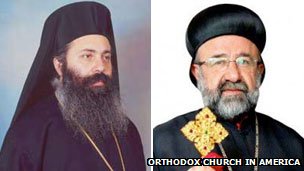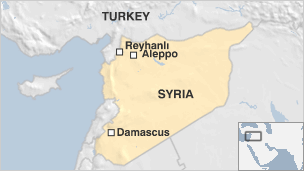Aleppo, April 24, 2013

|
There were reports that the two men, Yohanna Ibrahim and Boulos Yaziji, were back in the city of Aleppo.
But other sources with links to the bishops have told the BBC this is not so and their families are still worried about their whereabouts.
They had been returning from the Turkish border when they were seized.
It was not immediately clear who had kidnapped them.
Bishop Ibrahim is the head of the Syriac Orthodox Church in Aleppo, while Bishop Yaziji leads the city's Greek Orthodox Church.
They are the most senior Christian clerics caught up directly in the war.
Abductions on the rise
Kidnappings have increased dramatically in Syria in the past year but the abduction of such high-ranking Christian figures is unusual, the BBC's James Reynolds reports from the city of Istanbul, in neighbouring Turkey.

|
| BBC map |
President Assad's government has hoped to retain their loyalty, based on a shared fear of what might happen if Sunni Muslims take over the country, our correspondent says.
But some Christians have chosen to join the opposition - including George Sabra, the newly appointed leader of the opposition coalition, he adds.
State TV earlier announced that an "armed terrorist group" had kidnapped the two bishops as they carried out "humanitarian work in [the] Aleppo countryside".
Their driver is thought to have been killed in Monday's kidnapping attack.
Abdulahad Steifo, a Syriac member of the opposition Syrian National Coalition, said the men had been kidnapped on the road to Aleppo from the rebel-held Bab al-Hawa crossing, which is close to the Turkish town of Reyhanli.
Asked who was behind their abduction, he said: "All probabilities are open."
In an interview with BBC Arabic's Saeed Shehada a week ago, Bishop Ibrahim said he was optimistic about the future of Christians in Syria:
"There is no persecution of Christians and there is no single plan to kill Christians. Everyone respects Christians. Bullets are random and not targeting the Christians because they are Christians," he said.
According to the UN, at least 70,000 people have been killed in the civil war and more than one million are now living as refugees in neighbouring countries.
